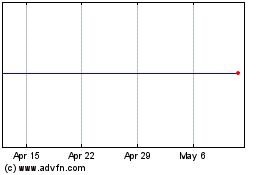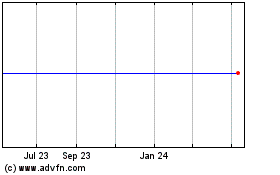Ranks of Women CEOs Get Slimmer -- WSJ
03 August 2017 - 5:02PM
Dow Jones News
By Joann S. Lublin
This article is being republished as part of our daily
reproduction of WSJ.com articles that also appeared in the U.S.
print edition of The Wall Street Journal (August 3, 2017).
Irene Rosenfeld's coming departure as chief executive of
Mondelez International Inc. doesn't just signal a change of
leadership at the snack giant. Her move also shrinks the slim ranks
of women in command of the biggest U.S. businesses.
Women now run 27 of the S&P 500 companies -- or 5.4% of the
total, reports Catalyst, a research group.
Similarly, 32 women led Fortune 500 companies as of early June.
That equaled 6.4%, the highest proportion in the 63-year history of
the Fortune 500 list. The figure soon slipped to 6.2% after Marissa
Mayer relinquished the helm of Yahoo Inc.
Those figures, along with reports showing only minor gains in
women's representation in corporate boardrooms, suggested that
gender parity in corporate life is at a virtual standstill, despite
companies' ever more vocal commitments to diversity.
So intractable does the issue seem that one in four Americans
believes they are more likely to see time travel during their
lifetime than they are to see women running half of Fortune 500
firms, according to a 2017 survey conducted for the Rockefeller
Foundation.
With each departure of a female CEO, "we are struggling just to
maintain that recent 'high point,"' said Brande Stellings, a
Catalyst senior vice president.
Ms. Rosenfeld, who will step down in November, isn't the only
female CEO heading out the door. Along with Ms. Mayer's departure,
Tegna Inc. Chief Executive Gracia Martore retired this June. She
ran media powerhouse Gannett Co. between 2011 and 2015, when it was
split into two separate businesses. Tegna is a broadcasting and
digital business.
A number of other women chiefs "are at a point where retirement
is in the cards," says Jane Stevenson, head of the global CEO
succession practice for Korn/Ferry International, an executive
recruitment firm.
"If there aren't strong (female) successors in the pipeline,
then we are going to lose ground rather than gain ground when it
comes to female CEOs," Ms. Stevenson continued. "We have had really
small progress over the last ten years."
Three of the 62 women running a Fortune 500 company since 1972
turned over the reins to another woman, according to Catalyst.
Ursula Burns took the helm of Xerox Corp. from Anne Mulcahy, but
was succeeded this January by Jeff Jacobson.
There are a few bright spots for female CEOs. Several big
businesses have hired or promoted women to their highest job this
year, including Signet Jewelers, Weight Watchers International
Inc., Mattel Inc. and Hershey.
The Rockefeller Foundation has launched a campaign to advance
women into the CEO spot at 100 of Fortune 500 companies by 2025.
Korn/Ferry is helping the foundation figure out how to move more
women into corporate leadership posts based on interviews with 58
women who currently or recently headed Fortune 1000 concerns.
Write to Joann S. Lublin at joann.lublin@wsj.com
(END) Dow Jones Newswires
August 03, 2017 02:47 ET (06:47 GMT)
Copyright (c) 2017 Dow Jones & Company, Inc.
Kraft Foods Inc. - Common Stock Ex-Distribution When Issued (MM) (NASDAQ:MDLZV)
Historical Stock Chart
From Mar 2024 to Apr 2024

Kraft Foods Inc. - Common Stock Ex-Distribution When Issued (MM) (NASDAQ:MDLZV)
Historical Stock Chart
From Apr 2023 to Apr 2024
